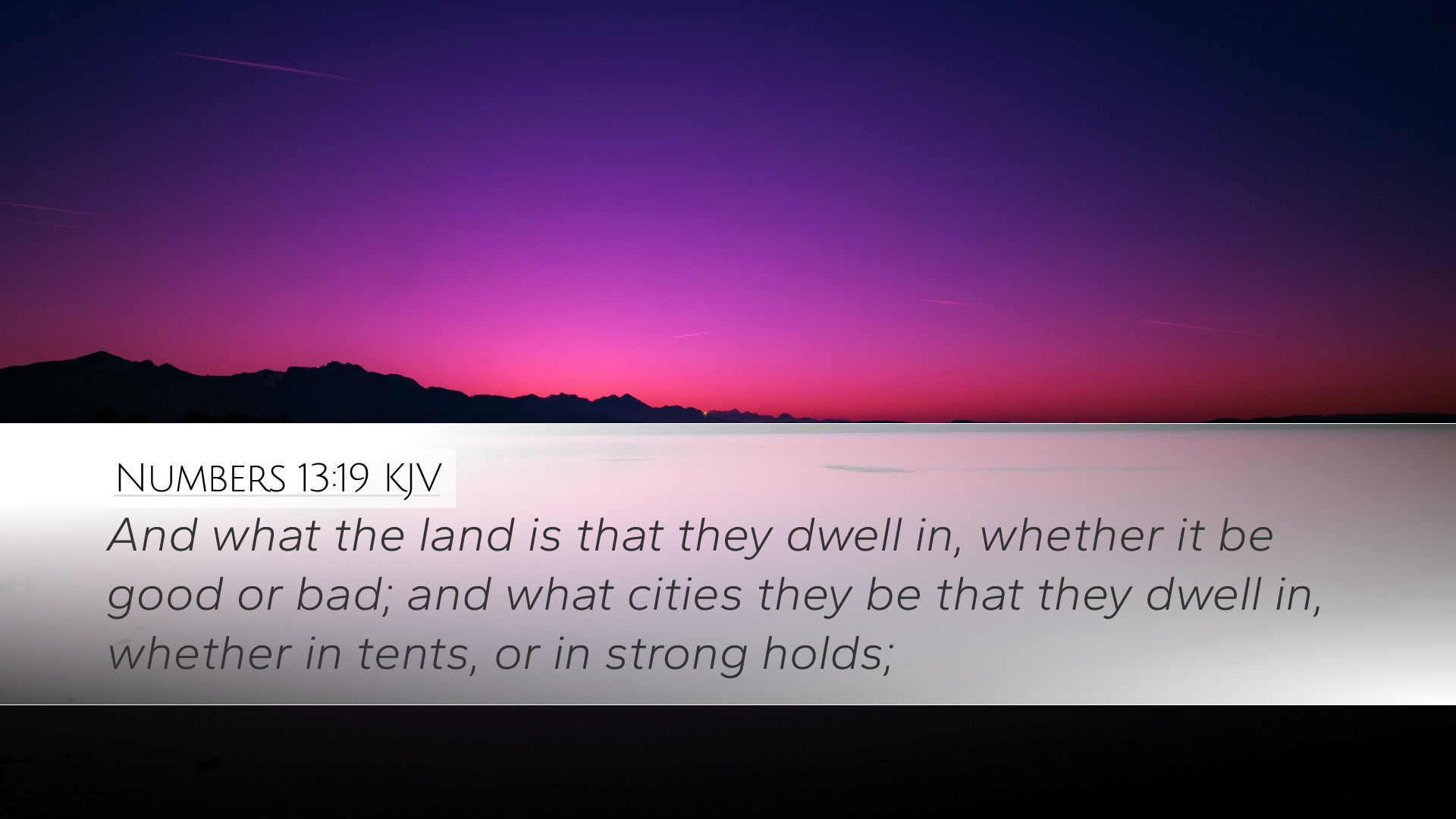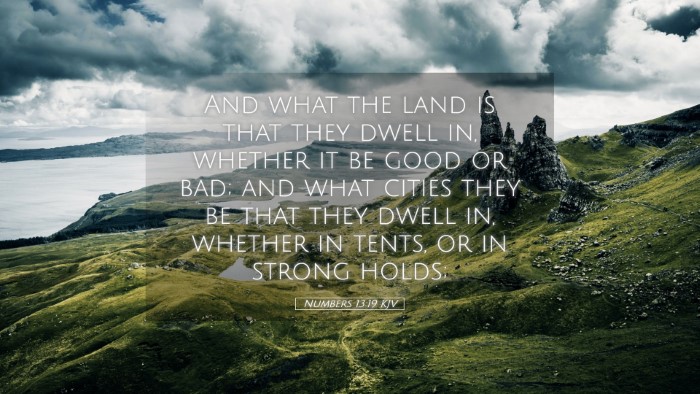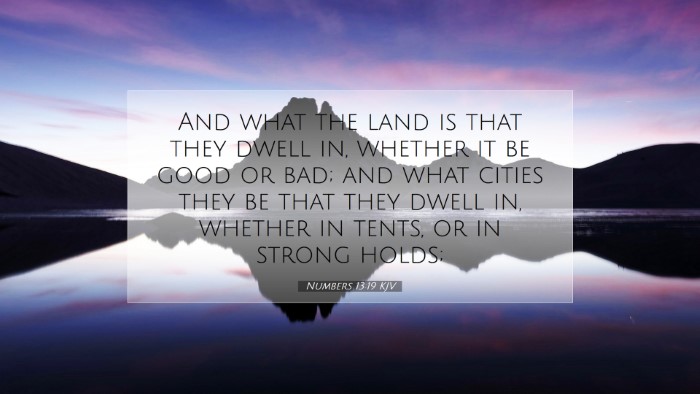Commentary on Numbers 13:19
Verse: "And what the land is, whether it be fat or lean, whether there be wood therein, or not. And be ye of good courage, and bring of the fruit of the land. Now the time was the time of the first ripe grapes." (Numbers 13:19)
Introduction
This verse occurs within the narrative of the Israelite scouts sent to explore Canaan, producing critical insights into the nature of faith, obedience, and the character of the Promised Land. The request to report on the land signifies a conditional response to God's promises and serves as a moment of decision for Israel.
Contextual Background
The Israelites, recently freed from bondage in Egypt, stand on the brink of entering Canaan, the land promised to their ancestors. God commanded the exploration of the land to validate His promise and prepare His chosen people for conquest. This verse highlights the specific inquiries directed at the scouts, which reveal the dual themes of testing and trust.
Analysis of Key Phrases
- "What the land is, whether it be fat or lean": This phrase encompasses the economic potential of the land. The terms 'fat' and 'lean' symbolize abundance versus scarcity, respectively, suggesting a concern with the land's capacity to support the Israelite population.
- "Whether there be wood therein, or not": The presence of wood signifies resources for building and sustenance. This inquiry indicates a practical concern for settlement and survival.
- "Be ye of good courage": This directive emphasizes the necessity of courage in the face of daunting challenges. The scouts are encouraged not only to gather information but also to provide a report infused with hope and faith.
- "Bring of the fruit of the land": Bringing back tangible evidence of the land's bounty is critical. This act serves as a testimony of God's provision and a reassurance of His promises.
- "The time was the time of the first ripe grapes": The timing of the exploration during the harvest season represents God’s perfect provision and synchronization with His people’s needs.
Theological Insights
The exploration of Canaan acts as a metaphor for spiritual journeys faced by believers. Each component of the scouts' mission offers insights into faith, showing that understanding God’s promises often involves practical evaluation without succumbing to fear.
- Faith and Fear: The Israelites had to confront both the overwhelming evidence of the land's abundance and the fear of its inhabitants. This dichotomy is mirrored in the challenges faced by believers today.
- Preparation and Provision: God’s instructions illustrate the balance between divine promises and human responsibility. The call to explore the land while being reassured of God’s past faithfulness indicates that spiritual journeys require active engagement.
- Community and Encouragement: The mission of the scouts also underscores the necessity of communal support. Encouraging one another to understand and act upon faith is essential in both biblical and contemporary contexts.
Commentary from Notable Theologians
Matthew Henry: Henry emphasizes that the inquiry into the land’s riches not only pertains to its physical attributes but also reflects a deeper theological commitment to trust God's providence. He notes that such inquiries should be approached with a heart anchored in faith rather than merely human skepticism.
Albert Barnes: Barnes delineates the duality of the inquiry, suggesting that while physical evaluations of the land are necessary, they should not overshadow the spiritual reality of God’s promise. He cautions against allowing the fears surrounding the inhabitants to dominate the discourse, signaling the continuous struggle between faith and sight.
Adam Clarke: Clarke draws attention to the significance of good courage, interpreting it as a divine requirement for the faithful. He suggests that real courage arises from trust in God’s unwavering support. Clarke also highlights the importance of bringing back fruit as a sign of the tangible blessings that God has prepared for His people.
Practical Applications
This verse offers multiple practical applications for believers, particularly leaders, students, and theologians:
- Assessing Resources: Just as the scouts collected data about the land, church leaders today should evaluate the resources, strengths, and weaknesses within their communities while trusting in God’s provision.
- Courage in Leadership: Leaders are encouraged to foster courage, reinforcing communal faith. They should cultivate environments where community members feel supported in facing fears and uncertainties together.
- Faithful Reporting: The call to bring back the fruit of the land serves as a reminder of the importance of providing testimonies of God’s goodness to inspire hope and faith in others.
- Timing and Spiritual Harvest: Recognizing the seasons of spiritual growth can aid in ensuring that communities are prepared to receive God’s blessings and utilize them for His glory.
Conclusion
Numbers 13:19 serves as a rich narrative that invites believers to reflect on the interrelationship of faith, provision, and courage in the pursuit of God's promises. The verse reminds us that while we encounter challenges, it is essential to maintain a perspective grounded in trust and communal encouragement. The inquiries into the land symbolize our own journey toward understanding God's will amidst the complexities of life.


